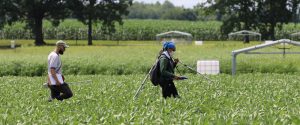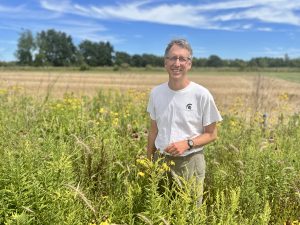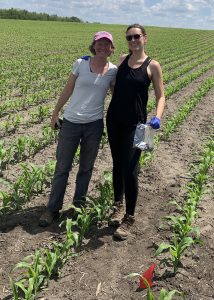Two long-term research programs with sites located at W.K. Kellogg Biological Station have received renewed funding this year.
Long-term Ecological Research program
Earlier this year, the KBS Long-term Ecological Research—LTER—program received a renewal of its foundational grant from the National Science Foundation, reaffirming its future and status as one of the country’s premier research sites.
MSU animal ecologist Nick Haddad and microbial ecologist Sarah Evans led the grant proposal, “Ecological and Social Mechanisms of Resilience in Agroecosystems.” In it, they detail the program’s new focus on climate change and land use change.
“We have inherited this incredible set of experiments and data from the past three-plus decades and now, with this grant in hand, we are looking at a bright future for the program,” said Haddad, a professor in the Department of Integrative Biology in the MSU College of Natural Science, and a KBS faculty member. “This grant provides the opportunity to answer new questions about how ecological systems are responding to global environmental changes and how we will work to understand the resilience of our ecosystems.”
With the renewed funding, KBS LTER will continue to test if harnessing biodiversity can also improve agriculture. Researchers are introducing strips of prairie habitat throughout corn and soy croplands. Establishing biodiversity on small sized prairie lands may take many years, but once microbes, plants, and insect predators, and pollinators are established, scientists can determine if their presence has a positive effect on soil health and crop yields.
“Securing this foundational NSF grant is key to our site’s continued success. By synthesizing the work from the last six years and finding salient themes, we formulated new hypotheses to test with new studies,” said Evans, an IBIO associate professor and KBS faculty member. “We are pushing science forward on all fronts in a variety of fields.”
Established in 1989, the KBS LTER is one of 28 NSF LTER sites nationally and is the only one dedicated to understanding the ecology of agricultural systems. With a focus on row crops, the 34-year-old program studies how agriculture can be environmentally friendly without harming yields.
Great Lakes Bioenergy Research Center
In March, the U.S. Department of Energy awarded the Great Lakes Bioenergy Research Center another five years of funding to develop sustainable alternatives to gasoline, diesel and other hydrocarbon fuels as well as products currently made from petroleum.
The extension will allow scientists at the Great Lakes Bioenergy Research Center, or GLBRC, to continue foundational research to enable the breakthroughs needed for the cost-effective conversion of non-food plants into low-carbon replacements for jet fuel, diesel and other fossil fuels. Those biofuels are a key component of plans to decarbonize the transportation sector and advance a sustainable, safe and secure bioeconomy.
“GLBRC is a flagship program and one of our most important partnerships,” said Doug Gage, vice president for research and innovation at MSU. “This collaboration has been a model for bringing together the research strengths of MSU, the University of Wisconsin and other partners to comprehensively address very complex problems. We look forward to continuing the collaboration to advance basic science and energy security for the U.S. and beyond.”

Graduate students Cheyenne Lei (right) and Pietro Sciusco conduct field measurements at KBS for GLBRC research.
Established in 2007 by the Biological and Environmental Research program in DOE’s Office of Science, GLBRC is based at UW–Madison’s Wisconsin Energy Institute in collaboration with Michigan State University and other partners. GLBRC research on sustainable cropping systems is conducted at KBS.
In addition to UW–Madison and MSU, the Great Lakes Bioenergy Research Center includes collaborators at the University of British Columbia, Texas A&M University, Michigan Technological University and Princeton University.
Over the past 15 years, GLBRC’s academic and industrial partnerships have yielded more than 1,700 scientific publications, 260 patent applications, 113 licenses or options and five startup companies.
Related articles
MSU’s Long-Term Ecological Research program awarded $7.65 million NSF grant | Jan. 10, 2023
GLBRC receives five-year funding renewal | March 17, 2023



A legacy of conservation; a commitment to sustainability.
3700 E. Gull Lake Drive
Hickory Corners, MI 49060
(269) 671-5117
info@kbs.msu.edu